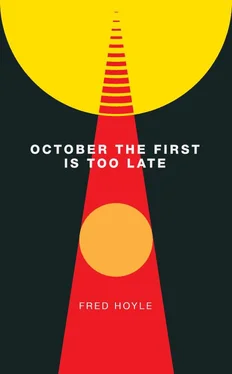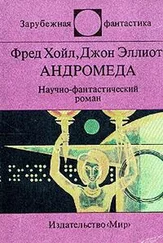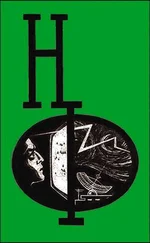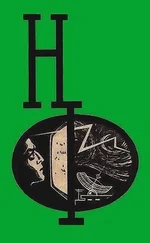It was amazing there was so little noise inside our sphere.
Once we quitted the vehicle back at our own valley we soon got thoroughly wet. The girls didn’t seem to mind in the least and strode along, uncaring. We followed them to a house which wasn’t ours. Quite a few people were already here. One of them showed us to what seemed to be a changing-room. There was a strong hot-air blower that dried you off completely in a couple of minutes. Then we picked ourselves a selection of garments and sealed ourselves up inside them. We took less than ten minutes but it could have been done in under three or four.
About twenty people came in that evening to what was evidently a party. It was not quite as free and easy as a party can be where everybody speaks the same language, because quite often we had to go through the translation system. Yet it was all far, far easier than attending any sort of function in a foreign country in the world of 1966. I had been right about the preparation of meals. They all made a big thing about the arrangement of the colours, into patterns like flower beds, and about the shape of the floor. They divided into two halves and had a kind of race. From the gun it took about ten minutes.
During the meal a sly game went on, of softening up the floor under one or another of us. It may sound ridiculous but it certainly looked funny, especially after a modicum of alcohol. Although everybody talked twenty to the dozen there was no appalling volume of sound. The floor, the ceiling, and the walls, were evidently sound absorbing. Yet when I had played the previous night I hadn’t had the impression of playing into a sink. It seemed as if the reflecting qualities of the room must be changeable.
After dinner the little piano suddenly appeared. It came in by itself through a doorway. There was nothing for it but that I should sing for my supper. There was a very good reason why everybody wanted to hear me. What I had already begun to suspect, that nobody in this society played any musical instrument, was confirmed. Music could be put together so readily using electronic techniques that incentive was quite lacking for anyone to go through the long years of drudgery so necessary for proficient performance.
The evening reminded me in a curiously vivid way of the party back so long ago in Los Angeles. I found myself beginning the waltz theme of the Diabelli variations. I had not played them since the night in Los Angeles. Until now I had associated Beethoven’s great masterpiece with a different time, a different age. But now the variations emerged with as much freshness as ever, and with more power than I had been able to produce on the instruments of that apparently far-off epoch.
Chapter Fourteen: Grave e Mesto
The following morning the party had quite dissolved. When Melea and I appeared for breakfast we found John talking to a white-haired man of about sixty. Melea instantly became serious. She said:
‘This morning it has to be different. It is about the film we stopped you from seeing the other afternoon. You will soon understand why it was better left until the end.’
This made me uneasy.
‘What do you mean, by there being an end?’
‘I think you must see first. After that you must hear what we have to say. Then you can decide.’
The two girls and the man left us. The beginning of the film appeared. Evidently the others didn’t want to watch it.
The showing took upward of four hours. It was the longest documentary film I had ever seen, naturally enough for it dealt with a time span of six thousand years. We covered time at an average rate of a century to each four minutes. There was no place here for intricate involvements, or for the niceties of politics. Yet it was all too easy to follow. The black record of the human species swept remorselessly on as the minutes and hours ticked away.
It was a shock at the beginning to be very quickly out of both the twentieth and the twenty-first centuries. The first quick point was a transition from poverty to affluence in the undeveloped continents of the twentieth century. Africa and Asia. A homogeneous civilization swept with incredible speed over the whole Earth. There were brief flashes of the people, of their machines, their customs, their political leaders. It was all done visually. We sat in silence watching, our ears free of the cacophonous uproar of the usual sound track. It was easy to comment to each other on what we saw, not that we had much to say beyond the occasional exclamation.
Earth teemed with people. Cities spread out farther and farther until they became joined to each other. Urban populations covered an increasing fraction of the land surface. At first it was only one per cent, then five per cent, then twenty-five per cent. The technological drive went irresistibly on. Land became of more and more value. There was no room any longer for any animal save man. So we watched the gradual extinction of the whole animal world. Even the bird population declined and withered away.
We saw something of domestic life. We saw the standardized little boxes in which almost everybody was now living. The insistent question formed in your mind, what was it all good for? What conceivable reason could there be to prefer a thousand little boxes to one dignified house? The same of course for the people. What was the advantage of this appalling fecundity of the human species?
Soon we were in the twenty-fifth century. Angry voices began to be heard. The pressures were mounting, competing with the technology. The technology itself was kept going by the most rigorous demands on individual freedom. It was indeed a veritable ant-heap. The average person became restricted to a life that lay somewhere between the freedom of the twentieth century and the lack of freedom of a man serving a life sentence in prison. Nobody travelled now, except on official business—I mean travelled to distant parts. Everything was provided in one’s own locality, food, amusements, work. The work itself demanded little initiative. The people were leading what can only be described as a punched-card life.
The technology wasn’t working too well any more. Food was mostly of poor quality, mostly factory produced. At that stage, in the twenty-fifth century, the seas were essentially swept clean of fish. The land animals had been the first to go, then the birds, now last the fish.
The first disaster happened with amazing suddenness. What had seemed a more or less homogeneous civilization split into two, like the division of an amoeba.
‘It’s a point of instability,’ whispered John. ‘Look, the whole thing’s going to grow exponentially.’
Whatever he meant, this vast gargantuan, sprawling, tasteless, in every way appalling, civilization exploded in a flash. It started with bombs and rockets, with fire. The film, so far silent, now came alive, not with any synthetic sound track, but with the crackling of the actual fire, with the shriek, instantly cut short, of a woman enveloped in a cloud of burning petrol. Then it was all over. It was quiet everywhere. Death and decay swept at an incredible speed, like some monstrous fungus, everywhere over the Earth. There was no movement, no transport, no food distribution. The intricate organization which had itself fed on the efforts of a large fraction of the whole population was dead. Everything which had depended on it, including the lives of the people, now died too. We could hear the whine of infants, the despairing cries of children. The abomination came at last to an end. It seemed as if the human species, having wiped everything else from the face of the planet, had now itself become extinct.
Miraculously this did not happen. A dozen or more specially favoured, especially lucky, small centres of population managed to survive. They were already beginning their recovery by the time we saw them, I suppose because no camera had been there to record the worst moments. Indeed the technique of photography suddenly became very crude, almost the way it had been when photography was first invented.
Читать дальше











